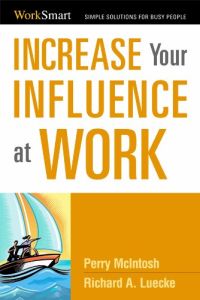Join getAbstract to access the summary!

Join getAbstract to access the summary!
Richard A. Luecke and Perry McIntosh
Increase Your Influence at Work
AMACOM, 2010
What's inside?
How to navigate the tricky shoals of workplace power struggles
Recommendation
In simple, straightforward prose, business authors Perry McIntosh and Richard A. Luecke define a clear, easily implemented program for gaining and keeping influence at work. This book, part of the Work Smart series, reads quickly. Its tactics and techniques are memorable and not difficult to put into practice. To maintain their rapid pace, the authors keep examples to a minimum, and those they include do a good job of illuminating their strategies. McIntosh and Luecke propose methods anyone can understand and retain, and even provide a moral primer to guide readers who might go astray in an overenthusiastic pursuit of influence. That the authors take great care to refer to readers and examples alike by both “he” and “she” proves how attuned they are to their own advice and to the exigencies of the modern workplace. Even though some introductory ideas reappear in similar form in the later chapters, getAbstract recommends this book to those who crave more power, influence and advancement at their jobs. And who doesn’t?
Summary
About the Authors
Business authors Perry McIntosh and Richard A. Luecke co-wrote The Busy Manager’s Guide to Delegation.

















Comment on this summary